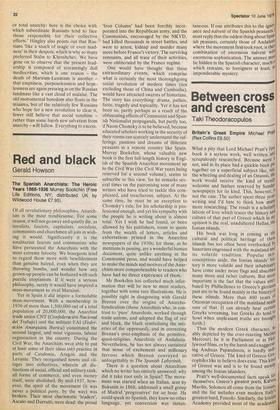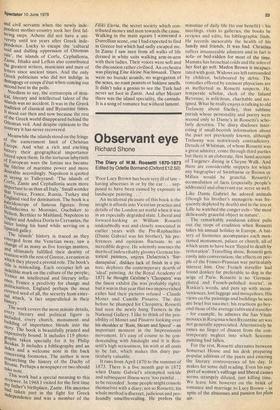Between cross and crescent
Taki Theodoracopulos
Britain's Greek Empire Michael Pratt (Rex Collins £9.50)
What a pity that Lord Michael Pratt's fits! book is a serious work, well written an!, scrupulously researched. Because were P not, and in its place had a quickie been put together on a superficial subject like, saY' the wheeling and dealing of an Onassis, the work would receive the kind of treuelY, welcome and fanfare reserved by Sunda, newspapers for its kind. This, however, Is not the case. The author spent three yeal/ writing and I'd hate to think how manY more researching. The result is a scholall labour of love which traces the history anu culture of that part of Greece which in req opinion is the real, unadultered Hellas, the Ionian islands.
His book was long in coming as the cultural and political heritage of the islands has too often been overlooked n,,) historians engrossed with the mainland arl' its volatile tradition. Popular MI?• conceptions aside, the Ionian islands' Ws' tory is more volatile and their inhabitant; have come under more flags and absorban many more and richer Cultures. But mue,e important is the fact that the values anti' buted by Philhellenes to Greece's gloriou! past are to be found mainly in the history(); these islands. More than 400 years en Ottoman occupation of the mainland mael,e sure of that. (I can already hear certant Greeks screaming, but Greeks do tend t° howl when unpleasant truths are brought forth.) Thus the modern Greek character, .93 ably depicted by the over-reacting Muhl Mercouri, be it in Parliament or in /Or lywood films, or by the harsh and exaggerf ing Andreas Papandreou, is hardly cative of Greece. The kind of Greece GOA' cophiles like to believe does exist. This ktuu of Greece was and is to be found mostlY among the Ionian islanders. Pratt's well-documented facts speak tr themselves. Greece's greatest poets, Kuhl' Mavilis, Solomos all come from the Ionian,' and the list includes even modern ItalY greatest bard, Foscolo. Similarly, the Ionian Academy provided most of the acadernKs and civil servants when the newly indePendent mother-country took her first faltering steps. Athens did not have a university until. ten years after Greek indePendence. Lucky to escape the 'cultural void and dulling oppression of Ottoman rule', the islands of Corfu, Cephallonia, Zante, Ithaka and Leflcas also contributed the greatest writers, musicians and men of ancient times. And the only letters since anciGreek politicians who did not indulge in demagogy or coups d'etat when coming out second best in the polls. , Needless to say, the cornucopia of musical, literary andintellectual talent of the islands was no accident. It was in the Greek tradition of classical and Byzantine times. ft stood out then and now because the rest the Greek world disappeared behind the °ttoman veil. And despite opinions to the contrary it has never recovered. Meanwhile the islands stood on the fringe af the easternmost limit of Christian t pe And what a rich and exciting History their geographical importance forced upon them. In the tortuous labyrinth nf European wars the Ionian sea became the lifeline of maritime power and more desirable accordingly. Napoleon is quoted as saying to Talleyrand: 'The islands of F°1111, Zante and Cephallonia seem more Portant to us than all Italy.' Small wonder tnat Venice, France, Russia, Turkey and England vied for domination. The book is a T,Italeidoscope of famous figures: from t'elladecima to Morosini, Ouchakov to Berthier to Maitland, Napoleon to i,NaPier and Andrea Doria to Cervantes, the tter losing his hand while serving on a 1:tanish galley. The islands' history is traced as they enierged from the Venetian sway, saw a change of as many as five foreign masters, and ultimately fulfilled their destiny of reunion with the rest of Greece, a reunion in vi.hich they played a pivotal role. The book's title is misleading. Each occupier left an mark on the culture of the people; enice an intellectual and literary influence, France a proclivity for change and Politicisation, England perhaps the most coveted seed of all, the security from exteri,!al attack, 'a fact unparalleled in their uistory,' The work covers the most minute details, e. very literary and political figure is lit)Icluded, every church, monument and lidding of importance blends into the stnrY. The book is beautifully printed and "Pensively bound. It includes 119 phototraPhs taken specially for it by Philip , oukas. It includes a bibliography and an index and a welcome note in the back ccnIcerning footnotes. The author is now r,sesearching the history of the Duchy of cironte. Perhaps a newspaper or two should take note. This work had a special meaning to this reviewer. In 1968 I visited for the first time place, Zante. His ancestor father's birth ad taken part in the fight for Greek IndePendence and was a member of the Filiki Eteria, the secret society which contributed money and men towards the cause. Walking in the main square I witnessed a Durrellian scene, one I had expected to find in Greece but which had sadly escaped me. In Zante I saw men from all walks of life dressed in white suits walking arm-in-arm with their ladies. Their voices were soft and the discussion rather civilised. An orchestra was playing Eine kleine Nachtmusik. There were no buzuki sounds, no segregation of the sexes, no roast peanuts or baklave smells. It didn't take a genius to see the Turk had never set foot in Zante. And after Mozart there was the island speciality, the cantada. It is a song of romance but without lament.



































 Previous page
Previous page